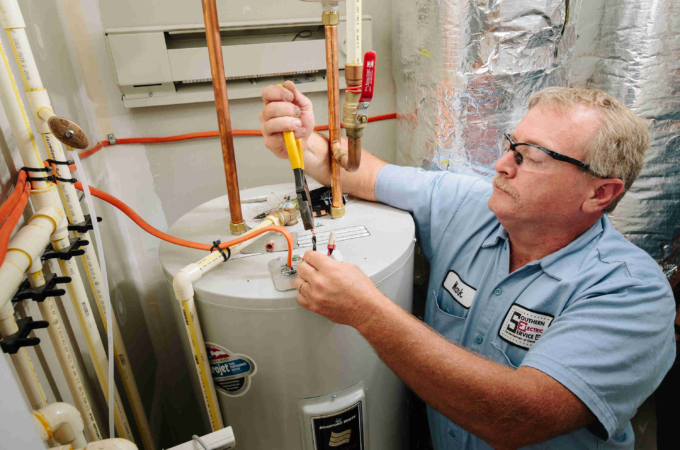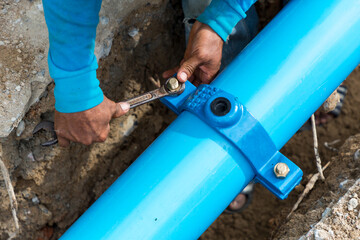What Does a Plumber Do?
Plumbers Dunwoody install, repair and maintain the pipes and fixtures that supply water or carry waste in residential, commercial, and industrial settings. Their job duties include inspecting systems to identify issues, testing for pressure levels and locating blockages, and preparing cost estimates for clients.
Plumbers must be able to listen to customers’ concerns and determine the best course of action to take. They often work with hand tools and must be comfortable working in tight spaces.

Plumbers install and connect pipes that supply water, drain waste, and carry hazardous materials. They use blueprints and building codes to plan layouts and ensure components are properly connected. They also repair existing plumbing systems, ranging from clogged drains to water heater malfunctions. This job requires a high level of customer service to educate customers on best practices for maintaining their plumbing, as well as strong troubleshooting skills to identify and fix problems quickly.
The primary qualifications for becoming a plumber are a high school diploma or equivalent and completion of an apprenticeship program under the supervision of a master plumber. Many states require plumbers to be licensed, and licensing requirements vary by state and municipality. Plumbers must pass a written and practical exam to earn their license.
Some plumbers work on residential and commercial properties, while others specialize in one type of property. Plumbers working on commercial buildings install and repair large-scale plumbing systems that serve multiple occupants, such as office buildings, apartment complexes, hotels, or hospitals. These types of projects require extensive collaboration with other construction tradespeople to ensure the plumbing is integrated seamlessly into the overall building structure.
Regardless of the type of project, all plumbers must have excellent critical thinking and problem-solving skills to effectively troubleshoot issues and find effective solutions. They must be able to analyze a situation, weigh possible courses of action, and determine the most efficient and cost-effective way to proceed. They must also be able to follow safety protocols when using power tools and other equipment.
As part of their job, plumbers may need to travel between homes or businesses to repair or inspect plumbing systems. This can involve driving to remote locations, climbing up and down ladders, and navigating tight spaces. In addition, they may need to lift heavy equipment and materials. For these reasons, plumbers should be physically fit and have good balance. They should also be comfortable wearing protective gear, such as goggles and face masks, when necessary. Finally, they should be able to communicate clearly and concisely with clients to understand their needs and provide them with accurate estimates for work.
Maintenance
The pipes that carry water and waste from home appliances and fixtures like sinks, toilets and showers are called plumbing systems. Plumbers maintain these systems by inspecting, repairing and replacing pipes and other fixtures. They also ensure that all plumbing installations adhere to building codes and safety regulations. Some plumbers specialize in specific types of plumbing, such as gas or sewer systems.
Construction plumbers install plumbing for new homes and commercial buildings. They work closely with architects and builders to ensure that the plumbing infrastructure is correctly designed and installed. This includes laying pipes, connecting fixtures and testing the system to make sure it works properly. Construction plumbers often work on a contract basis and must meet strict deadlines.
Service and repair plumbers troubleshoot and fix plumbing problems in residential and commercial settings. They have strong problem-solving skills and can quickly diagnose issues such as clogged drains, faulty water heaters and leaky faucets. Service and repair plumbers typically work on a call-out basis and may have to work outside of regular business hours in order to respond to emergency calls.
A plumber’s job can be physically demanding, requiring them to crawl into tight spaces and work in awkward positions. They may need to lift heavy equipment and tools, and they may be exposed to hazardous materials like raw sewage or toxic chemicals. Plumbers are also at risk for injuries from falls, slips and burns.
Plumbers are required to have a high level of mechanical skill and manual dexterity, as well as good interpersonal communication skills. They must be able to read blueprints and understand complex technical specifications. They must also be able to assess damage and plan repairs efficiently. Many plumbers also work with other professionals, such as engineers and construction teams, to ensure that all aspects of a project are integrated seamlessly and that all regulations and standards are met. They are required to be licensed in most states, and some plumbers join unions that negotiate their wages and benefits. A career as a plumber can be rewarding for those who enjoy working with their hands and have a strong interest in mechanical engineering.
Repair
Plumbing systems are complex, and despite the best efforts of homeowners, problems can arise. When they do, plumbers are called to assess the situation and make repairs. There are a variety of repair services plumbers can offer, ranging from unclogging drains to replacing water heaters. Plumbers have the technical training and experience to diagnose and resolve issues quickly.
Some of the most common plumbing repairs are for clogged toilets and drains. When at-home solutions don’t work, plumbers use a variety of tools to clear the blockage. They also inspect the problem with a camera to ensure the pipes are free of obstructions and properly functioning.
Another frequent issue that plumbers fix is leaking faucets and fixtures. These can occur due to worn washers, corrosion of the metal, or improper installation. In these cases, plumbers replace the part or adjust the installation to fix the leak.
Plumbers are also often called in to install or repair water filters and filtration systems. They have the knowledge and expertise to recommend and install the right system for a home or business, and they know how to properly connect it so that it works efficiently.
Many plumbing issues stem from poor water quality. While most homes have some sort of filtration system in place, they may not be doing enough to keep the water clean. This can lead to a variety of health and safety issues, including odors, skin problems, and respiratory problems. Plumbers can solve these issues by assessing the current filter and making recommendations for improvements or replacement.
Plumbing technicians are also skilled at installing and repairing gas lines. While some people assume that this skill is only relevant for gas stoves and fireplaces, plumbers can install natural gas lines for a range of appliances. This requires a significant amount of knowledge and training, as well as attention to detail. Plumbers who specialize in this area can help homeowners reduce their energy bills by ensuring the gas lines are properly connected and functioning.
Troubleshooting
Plumbers use a variety of tools and skills to troubleshoot plumbing problems. They can repair everything from leaky faucets to clogged drains, water heater issues, and more. They may work on a residential or commercial scale. Commercial plumbers deal with larger-scale systems like those found in office buildings, schools, hospitals, and manufacturing plants. These systems often involve more complex components like steam generators and boilers.
When a plumbing problem occurs, plumbers first need to gather as much information as possible about the issue. This includes understanding the symptoms, the environment in which the problem exists, and any recent changes that may have occurred. Then, they can begin to identify potential causes of the problem. This is known as the “elimination process,” in which possible causes are removed from consideration one by one until the problem is isolated.
One of the most common plumbing problems is clogged drains and toilets. These clogs can be caused by many different factors, including excessive amounts of hair, paper products, or other insoluble materials being sent down the drains. Plumbers can usually resolve these issues by using a drain snake or auger to break up and remove the clog. For more serious clogs, they may need to insert a drain cleaning machine into the sewer system to clear out the line.
Another common problem plumbers encounter is water filtration issues. They may need to replace filters, adjust water pressure, or perform other maintenance tasks to keep the water flowing properly. Plumbers also address issues with water quality, such as if the pH balance becomes out of whack.
Leaky pipes are a major concern for homeowners. These problems can range from a minor drip to a major flood, and they can cause severe water damage if not addressed quickly. Plumbers can repair or replace leaky pipes and faucets, as well as install new fixtures. They can also repair or replace damaged or corroded valves and other parts.




